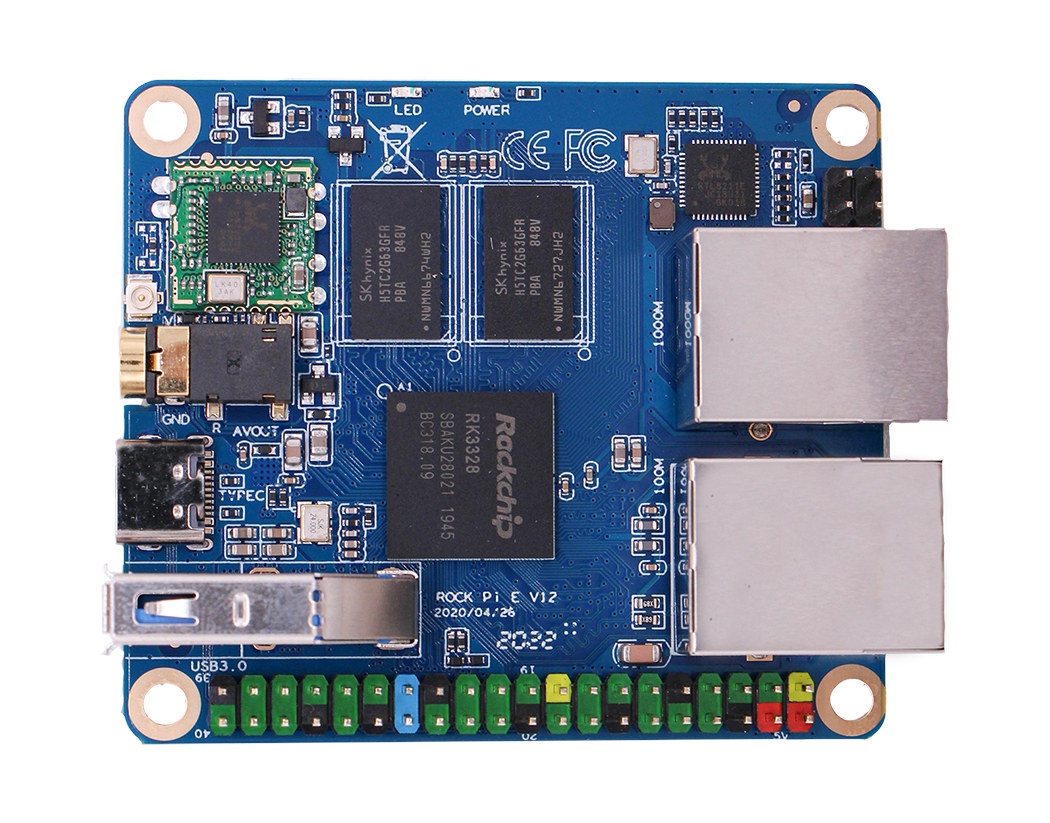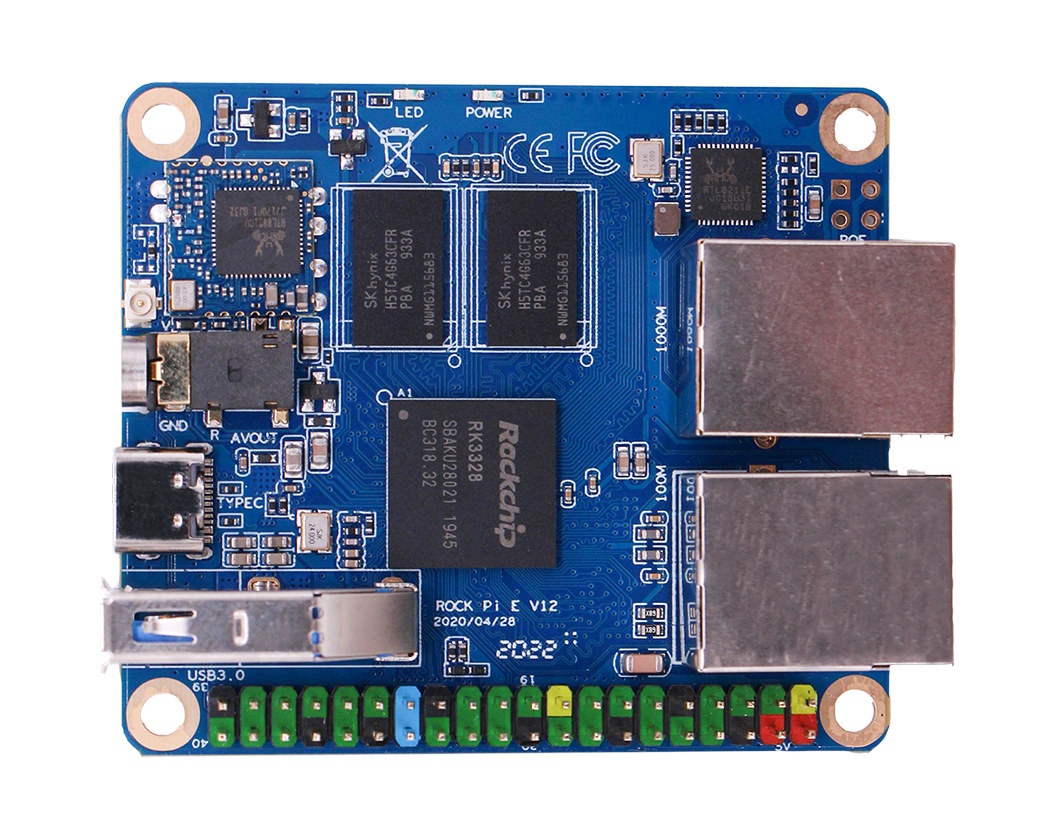Radxa has launched several Rockchip boards from the higher-end Rock Pi N10 (RK3399Pro) and Rock Pi 4 (RK3399) SBC’s, to the low-end and tiny Rock Pi S powered by an RK3308 Cortex-A35 processor.
The company has now launched Rock Pi E single board computer equipped with the popular Rockchip RK3328 quad-core Cortex-A53 processor and designed for router & gateway application with two Ethernet ports, WiFi, and Bluetooth. Power-over-Ethernet (PoE) also comes as an option.

Rock Pi E specifications:
- SoC – Rockchip RK3328 quad-core Arm Cortex-A53 processor @ up to 1.3 GHz
- System Memory – 256MB, 512MB, 1GB, or 2GB DDR3
- Storage – MicroSD card slot up to 128GB, eMMC module support ( 16GB / 32GB / 64GB / 128GB)
- Video & Audio – 3.5mm AV output jack (Not 100% sure whether composite video is supported)
- Connectivity
- 1x Gigabit Ethernet port with PoE support via an additional HAT
- 10/100M Ethernet
- Wireless
- 2.4 GHz 802.11 b/g/n Wifi 4 and Bluetooth 4.2 via RTL8723DU OR
- Dual-band 802.11b/g/n/ac WiFi 5 and Bluetooth 4.2 via RTL8821CU
- USB – 1x USB 3.0 Type-A host port
- Expansion – 40-pin expansion header with 1x USB 2.0, 1x I2C, 1x SPI, 2x
UART, 1x I2S, 5V, 3.3V and GND signals - Misc – Reset key, Maskrom key, LEDs
- Power Supply – 5V via USB-C port
- Dimensions – 56 x 65mm

The company provides Debian 10 Buster and Ubuntu 18.04 Bionic for the board, but there’s also an OpenWrt community image. More details can be found in the Wiki.
It reminds me a bit of NanoPi R2S dual Gigabit Ethernet SBC powered by Rockchip RK3328 SBC, with some of the most obvious differences being that Rock Pi E comes with one Gigabit Ethernet port, and one slower Fast Ethernet port because the board also offers a USB 3.0 port, as well as built-in WiFi and Bluetooth connectivity that’s missing on NanoPi R2S.
Not all options are available right now, and only three variants of Rock Pi E are sold on Seeed Studio:
- Rock Pi E D4W1P with 512MB DDR3, RTL8723DU (Wi-Fi 4 + Bluetooth 4.2), PoE support for $24
- Rock Pi E D8W2 with 1GB DDR3, RTL8821CU (Wi-Fi 5 + Bluetooth 4.2), no PoE support for $26
- Rock Pi E D8W2P with 1GB DDR3, RTL8821CU (Wi-Fi 5 + Bluetooth 4.2), PoE support for $28
Several variants of the board are also available on AllNetChina with a variant starting at $19 with 512MB RAM and no wireless module. There aren’t many details about accessories like the PoE hat and the eMMC modules, but I would assume those are the same as the ones used for Rock Pi 4.

Jean-Luc started CNX Software in 2010 as a part-time endeavor, before quitting his job as a software engineering manager, and starting to write daily news, and reviews full time later in 2011.
Support CNX Software! Donate via cryptocurrencies, become a Patron on Patreon, or purchase goods on Amazon or Aliexpress. We also use affiliate links in articles to earn commissions if you make a purchase after clicking on those links.




Just a tiny bit further and it would have been just the SBC I’ve been waiting for, with vanilla Linux support, two PCI-driven gigabit Ethernet ports, and a 802.11ac 2×2 module. I just want a fanless SBC that can act as a permanently upgradeable gateway and Wifi router at GigE speeds.
Unfortunately, these boards are built with CPU’s that aren’t really designed for dual Ethernet (rather intending to provide the option of GbE or 100Mb, not expecting both to be used at once, I think). Then the remaining interfaces are used for networking peripherals, resulting in a compromise all around. i.e. WiFi via SDIO, etc.
At least in this case the WiFi is via USB, which is an improvement.
I’d personally far prefer to have a USB2.0 host connector available, and the USB3 port used for a USB-GbE interface, but that would obviously increase the cost (both for the USB-Ethernet interface, and probably a USB hub chip as well).
Also not sure if there is USB OTG support via the USB-C connector?
> provide the option of GbE or 100Mb, not expecting both to be used at once
In contrast the RockPi E here is just made for that since the RK3328 contains both a 100Mb MAC/PHY combination and a GbE MAC at the same time, the latter to be combined with the usual RTL8211 PHY.
But that’s nothing new, even the first RK3328 SBC (Rock64) provided the same and all you needed was external Ethernet magnetics to make use of the additional 100Mb Ethernet signals on the pin header.
Yeah, I’m aware that both are provided. I just think that the people who designed the chip only expected one to be used. “If you want the cheapest option, use the 100Mb MAC/PHY, if you want highest performance, use the GbE MAC and provide your own PHY” I personally don’t think they expected to have both being used at once in a routing configuration.
The 3328 is designed as a media chip, not a router, after all.
From what I can make out, though, it may still be possible for it to have USB gadget functionality, since it has one USB2.0 OTG, one USB2.0 Host, and one USB3 host port. The USB2 Host used for the WiFi, USB3 externally exposed, and the OTG *might* be routed to the USB C connector?
> The 3328 is designed as a media chip, not a router, after all.
Sure, no offloading capabilities and stuff so that all the relevant work has to happen on the CPU cores. But honestly with a 100Mbit WAN port that’s no problem at all. Quad-core A53 at 1.3GHz can handle that.
Wrt OTG have you had a look at the hardware documentation already?
Took a look and that shows a USB 2 port on the headers. No indication of whether it is the OTG port or not, but I guess that means that there is nothing connected to the USB C port.
Ah well. I’ll keep looking for my ideal board! 🙂
I can tell you, ROCK Pi will make you happy this year.
IMO you should avoid writing misleading stuff like ‘MicroSD(TF) up to 128GB’ on the specs page (since if it’s above 32GB then it can handle up to 2TB since SDXC). And an information whether the USB2 on the pin headers is OTG if it is would be appreciated too.
Clearfog Base?
How do they handle the heat on this design, the SoC is on top.
Why using RTL wifi chips? Are they so much cheaper than bcm or anything else with a good track record in mainline? Wherever I came across some RTL wifi I had to deal with some obscure out of tree driver, hoping this will change in the future…
> Why using RTL wifi chips? Are they so much cheaper than bcm
With BroadCom/Cypress on SBC you end up with broken wireless security since your chipset is affected by Kr00k, BroadPwn and friends. And literally no SBC maker except RPi Trading Ltd. and Radxa/RockPi gives a sh*t: https://github.com/armbian/build/issues/1812
I thought we are talking about radxa?
And who knows if RTL is not having any of their own bugs?
And honestly as long as there is no proper in tree driver who is going to run after the driver with every mainline bump?
RTL is currently a lot cheaper than Ampak/Broadcom. I think this is due to Broadcom selling the business to Cypress. RTL has some very cost effective dual band chips, under $3 for modules.
Well I have a tv box with an rtl whatever for sure a capable hw but currently theres a ralink usb dongle plugged in, as there is only some obscure oot driver violating all kernel coding styles and disregarding all existing wifi frameworks.
RTL is Realtek, you have Ralink.
Thanks, but i meant I’m having a built-in realtek on SDIO and because of the driver situation a ralink/mediatek stick in the usb that works
Yes rtl8821cu is OOT kernel driver.
currently this gets better.
Someone from RTL has done some awesome work in his spare time
please look here
https://github.com/neojou/rtw88-usb
this is for 8822b and 8822c
Yepp for some of the chips there is this effort, but most modules are based on some other stuff not being worked on.
… gateway application
Is there any SBC with WiFi capable of handling 64 simultanous connections?
Alternately, are there any SBCs with dual ethernet capable of acting as PoE source to attach a commercial, dedicated WiFi gateway?